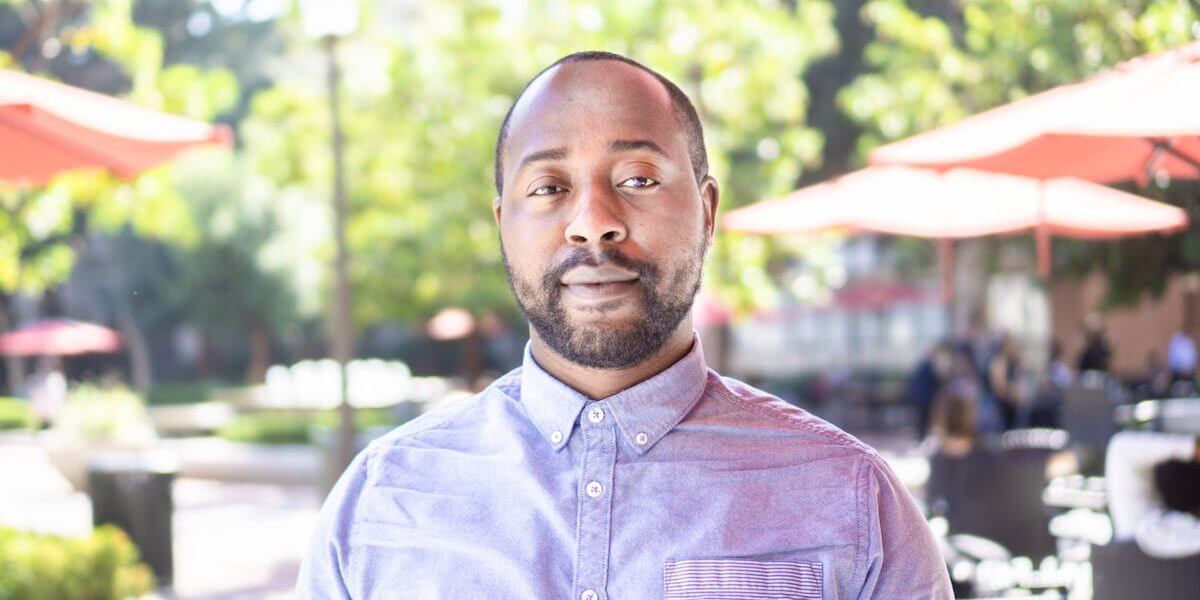
Emmanuel Johnson was recently named a 2021 Computing Innovation Fellow. (Image Credit: Deanie Chen from the Daily Trojan)
Thanks to COVID-19, many students have spent much of their college careers never stepping foot in a physical classroom. In this, Emmanuel Johnson, a USC Viterbi Computer Science Ph.D. (’21) and postdoctoral fellow, sees an opportunity: if we can truly learn from anywhere, what if our education was outside the boundaries of a single university? What if a professor or course could reach colleges across the country? This is all possible, according to Johnson, through something called a distributive classroom.
The distributive classroom model proposes a new way of learning: one that is not tied to a single university and outside of the binary way we tend to look at in-person and online education.
The distributed classroom is a “best of both worlds” approach, where remote learning is a tool to enhance students’ experience, rather than a backup plan. Johnson received the Computing Research Association (CRA) Computing Innovation Fellows award for his proposed research on the topic, an accolade reserved for training future leaders in computer science.
Collaborative higher education
Now with a fellowship, he wants to explore the possibility of collaborative higher education, where students could access professors and courses from a specific university anywhere in the country, even if they’re not enrolled there.
“The idea is that, rather than students being in the same location, you have multiple universities where students take the same course, with each lecture being taught by one instructor for all the locations,” Johnson said. Professors in each location work with their students to do class exercises in virtual teams, all while earning credits toward their own degrees at their home universities.
“We’re seeing more and more education going online,” Johnson said. “Because of that, we can take away the physical requirement in these courses.”
The distributive classroom isn’t just convenient– it’s potentially equalizing as well. Underrepresented students can tune into material that wouldn’t normally be available to them, preparing for careers that are long overdue for a change in demographics. For Johnson, this could be an opportunity to bring his field up to speed.
“As a historically black college and university grad, I’ve always wanted to do something to give back to my alma mater, North Carolina A&T,” said Johnson. “This grant is a way to bring more underrepresented students into artificial intelligence.”
Well-rounded engineers
USC’s strength as a research institution and its base in artificial intelligence made it a natural staging ground for Johnson’s research, but it’s also home to the Viterbi distance-learning pilot program iPodia, which teaches cybersecurity to students across the globe.
Using the groundwork iPodia laid, Johnson hopes to build encompassing artificial intelligence courses that can be taught to several universities at once.
“I want to take a step back and say, how well has this worked? What can we do to improve it?” explained Johnson. “We’re also thinking about the courses we’re going to teach, and how we can do it at these various institutions.”
In September 2021, Johnson finished his Ph.D. dissertation, which developed a new artificial intelligence approach for teaching people negotiation skills, advised by USC Institute for Creative Technologies (ICT) Research Professor Jonathan Gratch, and collaborator Gale Lucas, a research assistant professor. The difference between his Ph.D. and postdoctoral projects, according to Johnson, lies in their scope.
“Negotiation can be seen as a specific aspect of collaboration, and for this new work I’m popping up a level and looking at collaboration more in general,” Johnson said.
Both projects reflect his passion for teaching people to improve soft skills that are often neglected in a classroom environment, which he thinks are necessary alongside technical prowess to create a well-rounded engineer.
“I’ve always been interested in how we’re teaching and preparing engineers,” Johnson said. “Using distributive classrooms can build some of these other aspects of what it means to be an engineer.”
Increasing diversity in computing
Johnson’s postgraduate advisor Yolanda Gil, a Research Professor of Computer Science and Spatial Sciences and a Principal Scientist at USC’s Information Sciences Institute, shares a common interest in increasing diversity in artificial intelligence. Gil initially encouraged Johnson to apply for the award, citing the importance of teaching collaboration to future engineers.
“Emmanuel’s approach to innovating education could be leveraged to expand what students learn in class, and in the process increase diversity in computing,” Gil said.
“For years, we have had AI tutors that teach students math and physics concepts. Emmanuel’s Ph.D. research shows how to build AI tutors to learn well-known principles in practical negotiation skills, which are crucial in human interaction and yet very hard to learn. A distributed classroom is an ideal setting to extend that research, since students need to learn to collaborate in virtual teams.”
Going forward, Johnson sees a bright future for asynchronous, distanced learning. It’s something we’ve all become accustomed to, and its potential lies in wait as Johnson works to expand it. He hopes to offer USC’s artificial intelligence classes in collaboration with historically black colleges and universities.
“The goal is to provide a much richer educational experience while increasing access to AI education opportunities for all,” Johnson said. “Distributed learning is, in my opinion, where we’re going to go.”
Published on March 25th, 2022
Last updated on April 26th, 2025







